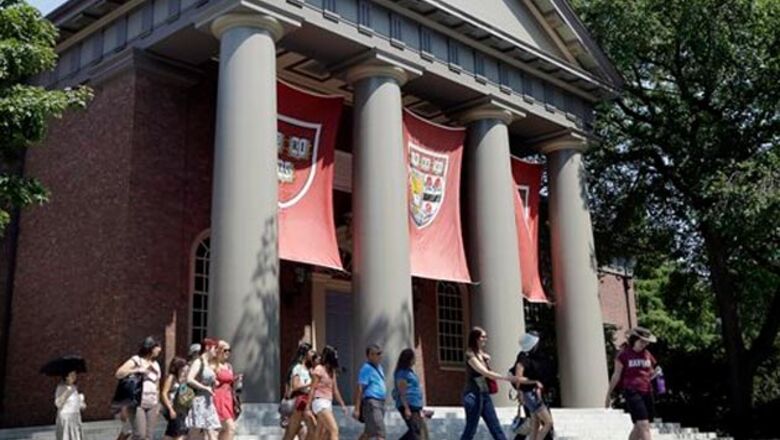
views
Cambridge: Harvard University will consider instituting an honour code as it investigates whether at least 125 undergraduates cheated by working together on a take-home exam in the spring. Officials said they intend to start broad conversations about academic honesty, including why it is vital to intellectual inquiry, in the wake of what is believed to be the largest such episode in recent school history.
"We really think we need to work harder," said Jay M Harris, dean of undergraduate education. "We do think it's an opportunity to really put out before the community how much we value integrity."
School officials said on Thursday they discovered roughly half of the students in a class of at least 250 people may have shared answers or plagiarised on a final. They declined to release the name of the class or the students' names.
"These allegations, if proven, represent totally unacceptable behavior that betrays the trust upon which intellectual inquiry at Harvard depends," President Drew Faust said.
A Harvard spokesman said he knows of no incidents in recent memory of possible cheating at the university on this scale.
Each student whose work is in question has been called to appear before a subcommittee of the Harvard College Administrative Board, which reviews issues of academic integrity.
Possible punishments range from an admonition, a sort of warning for a first offense, to being forced to withdraw from Harvard for a year. It wasn't immediately clear what sanctions any student who has graduated may face.
Harris emphasized that none of the allegations has been proven and said there's no evidence of widespread cheating at Harvard.
"The facts that are before us are that we have a problem in this one course," Harris said. "I hope that doesn't sound overly naive, I don't want to be naive, but this is what we have. The rest would be speculation."
The spring course included undergraduates at all class levels, Harris said. A teaching assistant noticed some possible problems on the tests, including evidence that students collaborated on answers or used the same long, identical strings of words. The exam had clear instructions that no collaboration was allowed.
The assistant notified the professor, who referred the case in May to the administrative board. After interviewing some students, the board found what Harris characterized as "cause for concern."
There's no timeline for when the investigation will be finished, Harris said, but in the meantime the school hopes to use the incident to spur broader conversations.
A Harvard committee on academic integrity he leads will present recommendations on how to enforce faculty-wide expectations of academic honesty. The school will also consider an honour code, which some schools use to set standards for honesty. In some cases, students are required to sign completed work, attesting that they followed those standards.
On campus, where students are just starting to return from summer break, news of the investigation was met with surprise.
"You think of Harvard as somewhere where people are academically honest and interested in their course work," said Michael Zimmet, a freshman from Aspen, Colo.
Tiffany Fonseca, a sophomore from Boston, said she didn't know the details of what happened, but that it was easy to see how students could talk to each other about a take-home test.
"I'm kind of shocked, but I'm not," she said.
















Comments
0 comment